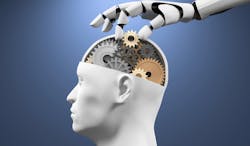This article first appeared in the September/October 2024 issue of Pro Builder.
If you’ve paid any attention to this column over the last six-plus years, you know I’m a fan of technology and innovation for the housing industry. But artificial intelligence (AI) is different. For all it purports to do and deliver in terms of making aspects of the building business more efficient, I believe AI has at least one basic flaw: the eventual end of human learning.
By definition, AI is a learning technology that will continue to get “smarter” as it absorbs and analyzes more information, thus taking more and more of that “chore” out of the hands (and minds) of humans. And as AI gets smarter and we rely increasingly on it, the dumber we’ll get.
Forget Hollywood doomsday scenarios; what I’m getting to is far worse: the inability of people to learn and think critically and creatively as they rely more on AI to do that for them.
RELATED
- So You Want to Be a Disrupter in Housing?
- Home Builders, What's Your Off-Site Construction Super Power?
- Killing Home Building's Sacred Cows
A child of the analog era, I had to learn the long way to get things done. It was markedly less efficient than today, but that journey gave me a solid foundation of how to get information, form questions, build a knowledge base, and develop processes … and then draw from that well of information to conjure and deliver the best possible outcomes.
Artificial Intelligence vs. Human Intelligence and Learning
AI pundits say machine learning technologies relieve that burden, freeing us to focus on creative and person-to-person pursuits only humans can do. But aside from increasing evidence that AI also wants to (and can, to some extent) create from its learnings, I’d argue (ironically) that human creativity can only come from learning the basics, from which we develop nuance, intuition, and imagination that machine learning can’t.
Paraphrasing Picasso, you have to know the rules before you can break them. But I don’t think AI knows or cares about the rules, and thus, it has no problem breaking them. And that’s to our detriment as we blindly turn to AI more and more for “truth” and “facts” that form our opinions and approaches to problem-solving and creativity.
I’m a fan of technology and innovation for the housing industry. But artificial intelligence is different.
I firmly and sincerely believe there is no substitute for a self-driven learning process if you truly want to do your job effectively with passion and expertise and achieve exceptional results. There are sincere and lasting benefits to be derived from doing the legwork, learning by trial and error, and going down rabbit holes. Technology cannot—and should not—replace that. And leadership should support it.
It’s no different for a building business: Your sales and marketing folks, site superintendents, purchasing and estimating managers, design pros, and warranty team can only excel if they have the tools, time, and support they need to learn for themselves—instead of abdicating that responsibility to AI.
Otherwise, I fear we risk having future generations so reliant on AI that it impairs their ability to think critically and be creative, to solve problems, and to ensure the success of our industry. Now that’s a doomsday scenario.
About the Author

Rich Binsacca, Head of Content
Rich Binsacca is Head of Content of Pro Builder and Custom Builder media brands. He has reported and written about all aspects of the housing industry since 1987 and most recently was editor-in-chief of Pro Builder Media. [email protected]
